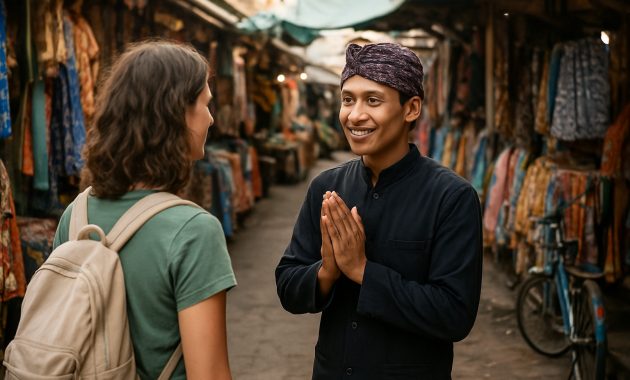
Yogyakarta, or Jogja, is more than just temples, batik, and street food—it’s a city deeply rooted in Javanese traditions and values. For tourists, understanding Yogyakarta local etiquette is just as important as knowing where to visit or what to eat. Respecting customs not only enriches your travel experience but also helps you connect with the locals on a deeper level.
This guide will walk you through the do’s and don’ts of Yogyakarta etiquette, from greetings and temple manners to dining and dress codes. By following these cultural insights, you’ll show respect while enjoying a smoother and more rewarding trip.
Why Respecting Local Etiquette Matters in Yogyakarta
Yogyakarta is considered the cultural heart of Java, where traditions and daily life are influenced by centuries of Javanese philosophy and royal customs. Locals place great importance on politeness, harmony, and respect. As a visitor, being mindful of these values not only shows courtesy but can also open doors to warm hospitality, friendly conversations, and even invitations to local homes or ceremonies.
Do’s in Yogyakarta
1. Greet with a Smile and Politeness
- Javanese people are known for their hospitality. A simple smile and a polite “Selamat pagi” (good morning) go a long way.
- Use your right hand when shaking hands or giving/receiving something.
2. Dress Modestly, Especially at Temples and Palaces
- Shoulders and knees should be covered when visiting Borobudur, Prambanan, and the Kraton.
- Sarongs are often provided at temple entrances if needed.
3. Show Respect in Sacred Places
- Speak softly, avoid climbing on statues, and follow posted rules.
- Always walk behind people who are praying.
4. Use Both Hands When Giving or Receiving
Offering money, gifts, or food with your right hand (or both hands) is a sign of respect. Avoid using only your left hand.
5. Learn Simple Javanese or Indonesian Phrases
Words like “Matur nuwun” (thank you in Javanese) or “Permisi” (excuse me) show effort and respect.
6. Bargain Politely in Markets
Haggling is common at Beringharjo Market or Malioboro Street, but always do it with a smile and courtesy.
Don’ts in Yogyakarta
1. Don’t Point with Your Finger
Pointing directly at people or objects is considered rude. Instead, gesture with an open hand or your thumb.
2. Don’t Touch Someone’s Head
The head is considered the most sacred part of the body. Even children’s heads should not be touched.
3. Don’t Show Excessive Public Affection
Hugging or kissing in public is frowned upon. Keep displays of affection subtle.
4. Don’t Raise Your Voice or Argue in Public
Javanese culture values calmness and self-control. Getting angry or shouting is seen as disrespectful.
5. Don’t Use Your Left Hand Alone
Whether handing over money, food, or gifts, avoid using only your left hand. It is seen as impolite.
6. Don’t Enter Homes or Mosques Without Permission
Always ask before entering a private space, remove your shoes, and follow the host’s lead.
Dining Etiquette in Yogyakarta
- Meals are often shared, and it’s polite to wait until the eldest starts eating before you begin.
- Use your right hand for eating traditional foods if cutlery is not provided.
- Leaving a little food on your plate is acceptable, but finishing everything shows appreciation.
Etiquette During Festivals and Ceremonies
- When attending cultural performances or religious ceremonies, dress modestly and behave respectfully.
- Photography may be restricted—always ask for permission first.
- Offerings and rituals should not be disturbed; observe quietly.
FAQs on Yogyakarta Local Etiquette
Is it okay to wear shorts in Yogyakarta?
Yes, but avoid shorts when visiting temples, palaces, or religious sites.
Can tourists take photos anywhere in Yogyakarta?
Not always. Always ask for permission before photographing people, especially in traditional ceremonies.
Do I need to know Javanese to interact with locals?
No, but learning a few words in Javanese or Indonesian will be greatly appreciated.
Is bargaining rude in Yogyakarta?
Not at all—bargaining is common, but it should be done with respect and a smile.
Are tips expected in Yogyakarta?
Tipping is not mandatory but appreciated, especially in restaurants, hotels, or by guides and drivers.
Can I visit a mosque as a tourist in Yogyakarta?
Yes, but you must dress modestly, remove your shoes, and avoid entering during prayer times unless invited.
Is physical contact acceptable in Yogyakarta?
Handshakes are fine, but avoid hugs or kisses in public unless you know the person well.
How should I address locals?
Use polite titles like “Bapak” (Mr.) or “Ibu” (Mrs./Madam) when addressing elders.
Is giving gifts common in Yogyakarta?
Yes, especially when visiting someone’s home. Offer small gifts like snacks or souvenirs, using both hands.
Can I eat with my left hand?
It’s better to use your right hand for eating, giving, and receiving, as the left is considered impolite.
What should I avoid during temple visits?
Avoid loud behavior, climbing restricted areas, and inappropriate clothing.
Is it rude to refuse food in Yogyakarta?
It’s polite to accept at least a small portion when offered, even if you’re not hungry.
Final Thoughts
Understanding Yogyakarta local etiquette is key to experiencing the city respectfully and authentically. Small gestures—like using your right hand, dressing modestly, or greeting with a smile—show locals that you appreciate their culture. By following these do’s and don’ts, you’ll not only avoid cultural missteps but also create meaningful connections during your journey in Jogja.
Travel with respect, and Yogyakarta will reward you with warmth, hospitality, and unforgettable memories.